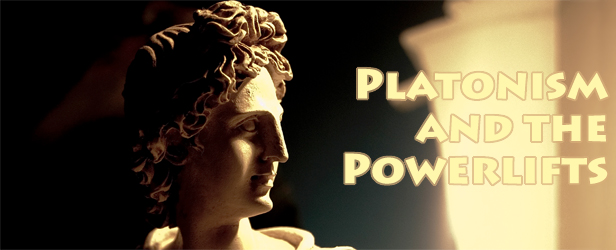
It’s often been said that no one’s ever performed the perfect squat. Go ahead for a moment and imagine, for yourself, what such a creature might look like. Will it be high bar or low bar, wide stance or close, to parallel or full depth, free or to a box?
As an analogy, imagine some red objects: birds, cars—it doesn’t matter. Imagine as many red objects as possible. Now that you’ve done that, imagine Redness itself—independent of any object it instantiates. Socrates, and his pupil Plato, believed that there were Forms—the Form of Goodness itself, the Form of Beauty itself, the Form of Justice itself—of which individual items, which appear in space and time, participate. So individual red objects, in our analogy, participate in, or are instantiations of, the Form of Redness itself.
So returning to the powerlifts. Try again to imagine the perfect squat. We might say that individual squats we see, or perform, to greater or lesser degrees, participate in the Form of the Squat itself. So we call squat X, performed by lifter Y, better or worse depending upon the extent to which, in our estimation, this individual’s squat participates in the Form of the Squat, as we understand it. So on this account, we may say there is no perfect squat performed in space and time, but better and better squats might be a bit like longer and longer calculations of pi: ever closer to the truth, or to perfection, but never quite reaching there. Rather than be disappointed in this, we might see it as the opportunity to grow over a lifetime, in the project of bettering ourselves.
And the same of course can be said of the deadlift, and the bench press. When we see very excellent bench pressers, such as Vincent Dizenzo or Scott Yard, we praise their technique as being not only efficient, but beautiful; and on the Platonic account of things, we can say that their particular presses participate in the Form of the Bench Press itself—which once again, in its perfection, will never be entirely instantiated in space and time, but which ever better representatives might be performed by us or others.
Really analyze a master technician in a particular lift. Then compare their efforts to those of a beginner. We can say that the virtue of the experienced lifter is a kind of knowledge; and we can say also, in the spirit of Platonism, that this knowledge is of the Forms of the Lifts-themselves, which, like Redness itself, is an ideal of which particular instantiations can only participate, to greater or lesser degrees.









